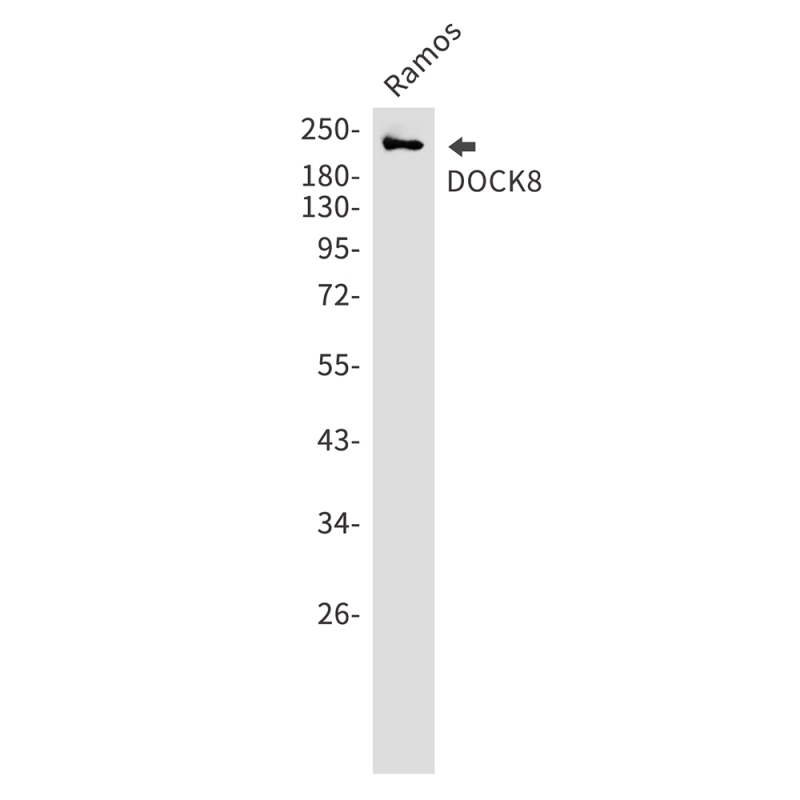
| WB | 咨询技术 | Human,Mouse,Rat |
| IF | 咨询技术 | Human,Mouse,Rat |
| IHC | 咨询技术 | Human,Mouse,Rat |
| ICC | 1/50-1/200 | Human,Mouse,Rat |
| FCM | 咨询技术 | Human,Mouse,Rat |
| Elisa | 咨询技术 | Human,Mouse,Rat |
| Aliases | MRD2; ZIR8; HEL-205 |
| Entrez GeneID | 81704 |
| WB Predicted band size | Calculated MW: 239 kDa; Observed MW: 239 kDa |
| Host/Isotype | Rabbit IgG |
| Antibody Type | Primary antibody |
| Storage | Store at 4°C short term. Aliquot and store at -20°C long term. Avoid freeze/thaw cycles. |
| Species Reactivity | Human |
| Immunogen | Recombinant protein of human DOCK8 |
| Formulation | Purified antibody in TBS with 0.05% sodium azide,0.05%BSA and 50% glycerol. |
+ +
以下是关于DOCK8抗体的3篇参考文献的简要概括:
1. **文献名称**:*DOCK8 deficiency impairs CD8+ T cell survival and function in humans and mice*
**作者**:Engelhardt KR, et al.
**摘要**:研究揭示DOCK8基因缺陷导致患者CD8+ T细胞功能异常,同时伴随B细胞抗体类别转换缺陷,导致低免疫球蛋白血症和特异性抗体反应受损。
2. **文献名称**:*Mechanisms of impaired humoral immunity in DOCK8-deficient patients*
**作者**:Zhang Q, et al.
**摘要**:通过分析DOCK8缺陷患者的B细胞,发现DOCK8缺失会破坏B细胞迁移、存活及抗体生成,导致对病原体的抗体反应显著降低。
3. **文献名称**:*DOCK8 regulates B cell survival and homeostasis in healthy and immunodeficient individuals*
**作者**:Baptista MA, et al.
**摘要**:研究表明DOCK8通过调控B细胞受体信号通路维持B细胞稳态,其缺陷导致抗体多样性减少及记忆B细胞发育异常,加重感染风险。
4. **文献名称**:*Clinical and immunological features of DOCK8 deficiency: A systematic review*
**作者**:Al-Herz W, et al.
**摘要**:综述指出DOCK8缺陷患者普遍存在高IgE综合征、严重病毒感染及抗体缺陷,强调早期抗体替代治疗和骨髓移植的重要性。
(注:以上文献为领域内代表性研究,实际引用时需核对具体期刊与年份。)
DOCK8 (Dedicator of Cytokinesis 8) is a member of the DOCK protein family, which functions as guanine nucleotide exchange factors (GEFs) regulating small GTPases like CDC42 and RAC1. These GTPases are critical for cytoskeletal reorganization, cell migration, and immune cell signaling. DOCK8 is predominantly expressed in hematopoietic cells and plays a key role in immune surveillance, T-cell activation, and dendritic cell function. Mutations in the *DOCK8* gene cause a rare autosomal recessive combined immunodeficiency (DOCK8 deficiency), characterized by severe allergies, recurrent infections, and susceptibility to viral and bacterial pathogens.
DOCK8-specific antibodies are vital tools for studying its expression, localization, and interactions in immune cells. They enable detection of DOCK8 in techniques like Western blotting, immunofluorescence, and flow cytometry, aiding research on its role in immune dysregulation and disease mechanisms. Commercially available antibodies target specific epitopes, allowing differentiation between wild-type and truncated forms in patient samples. Recent studies also explore DOCK8's involvement in cancer and autoimmune disorders, expanding its relevance beyond primary immunodeficiencies. Validating antibody specificity remains crucial, as cross-reactivity with other DOCK proteins or isoforms can complicate data interpretation. Overall, DOCK8 antibodies advance understanding of immune regulation and therapeutic strategies for DOCK8-related pathologies.
×